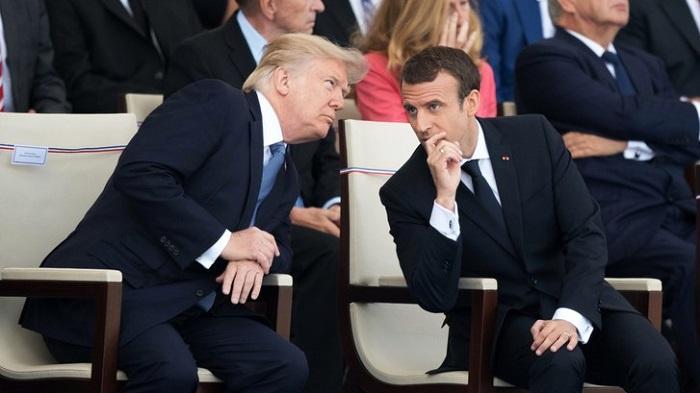Macron-Trump Duet on Iran

Can the French President Emmanuel Macron save the Iran nuclear deal? Nowadays, all eyes are set on this question as the May 12th deadline for Trump's Iran decision draws near. In light of the latest developments in the US-French diplomacy, another pertinent question is: can Macron manage to safeguard his presidency from being infected by Trump?
The latter question owes itself to the fact that Macron has bandwagoned with Trump on Syria and engage in a blatant aggression against a sovereign nation based on the unsubstantiated allegations of chemical strike by the Syrian regime, i.e., Macron's self-declared 'red line', although one must ask him why he has no such red lines for the atrocities in Yemen or the Syrian opposition groups' use of chemical weapons?
This aside, Macron's latest concession to Trump is with respect to the Iran nuclear deal, in light of Macron's announcement of his intention to work with the US toward a "new nuclear deal with Iran," although the "4 pillars" mentioned by Macron pertain mostly to non-nuclear issues, such as Iran's "regional meddling," Syria, and its conventional ballistic missiles. Without doubt, while Macron's singular effort to create a diplomatic path with Trump over Iran is laudatory, unfortunately he concedes too much ground to Trump to have even a minimum hope of any tangible results. A more prudent approach by Macron would have been to put his foot down and defend the Iran nuclear deal, as he had on numerous occasions, instead of slipping down the slippery road of turning into a 'Trump whisperer' on the deal. He now risks being labeled as 'France's Tony Blair' and, worse, 'Trump's poster boy in Europe," a Europe that largely despises Trump so much so that he has had to cancel his London visit out of fear of mass protests. In other words, Macron's cozying to Trump carries sunk costs for the young French president who is struggling at home with the unions and workers strikes and his popularity is decreasing. By caving in to Trump on Iran and essentially joining the Trump camp on Iran, Macron has provided fresh fuel for the growing anti-Macronism at home and in European politics, a sharp departure from a year ago when he was highly regarded as the representative of a "new" and "dynamic" Europe. Sadly, by choosing to toe Washington's line on the Middle East, all that initial enthusiasm for Macron has by and large disappeared and given way to new skepticisms regarding his ability to safeguard France's traditional independence, notwithstanding his willingness to mortgage France's foreign affairs to the White House.
Needless to say, this does not bode well for the future of Iran-France relations, that has much improved since the nuclear deal went into effect over two years ago, reflected in a whopping 80 percent increase in their bilateral trade in 2017. Macron's catering to Trump on Iran maybe intended to protect the French interests in Iran, but that is unlikely to happen so long as Trump continues to push the anti-nuclear deal button with his threats and ultimatum. A better Macron approach in his Washington visit would have been to put skillful French diplomacy to work by convincing Trump that the net result of his exiting the Iran nuclear deal will be a costly trans-atlantic rift that harms the national interests of both nations. In a word, Macron's proposed "new nuclear deal" with Iran is a non-starter and the sooner it is abandoned, the better.

